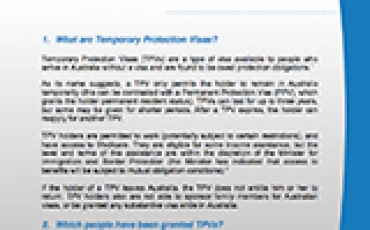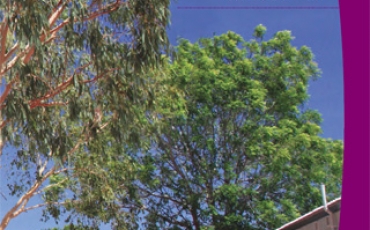Pathways to Protection: A human rights-based response to the flight of asylum seekers by sea

President’s introduction
Australia’s policy of sending asylum seekers and refugees to Nauru and Papua New Guinea’s Manus Island for processing of their claims has been one of the most contentious aspects of Australia’s migration policies.
Introduced in 2012, third country processing has been a key plank of successive Australian governments to deter asylum seekers from travelling to Australia by sea. Those who reach our shores are not permitted to settle permanently in Australia and the boats carrying asylum seekers are turned back. These policies of deterrence have significantly slowed the numbers of asylum seekers arriving by boat. On the other side of the ledger is the fact that hundreds of asylum seekers and their children remain in Nauru and Manus Island without any certainty about their future, and with their mental and physical health continuing to deteriorate.
Australian asylum seeker policy has now reached an impasse.
Refugees and asylum seekers continue to be held on Manus Island and Nauru, in some cases for years. As at 31 July 2016, there were 833 men at the third country processing facility on Manus Island and 411 at the facility in Nauru, including 49 children.1 Diplomatic efforts to find other countries willing to resettle refugees arriving in Australia have failed. The United Nations High Commissioner for Refugees (UNHCR) and members of the United Nations Human Rights Council, among others in the international community, have consistently raised their concerns that the current model of third country processing breaches human rights.
The decision of the High Court of Australia that third country processing is constitutionally valid stands in contrast to the finding of the Supreme Court of Papua New Guinea that detention on Manus Island contravenes that country’s constitutionally-protected right to liberty.
As President of the Australian Human Rights Commission, I am often asked:
While we know what is happening on Manus Island and Nauru is wrong, what are the alternatives?
How can we defend our borders, manage immigration in the national interest and stop people smuggling, while also respecting the rights of asylum seekers?
The recent election of a new Federal Government provides an opportunity to consider alternatives to third country processing that will both secure Australia’s sovereign borders and provide refugees with protection consistently with their human rights. Despite a largely bipartisan approach to third country processing, Australia remains legally bound to ensure that its policies comply with international human rights law.
I hope that this Report presents some positive proposals to break the current policy deadlock; that Australia’s policy response shifts from a deterrence-based to a rights-based approach that prioritises safety of life at sea and pathways to durable solutions.
The purposes of this Report are to:
- Stimulate and inform public discussion about alternatives to Australia’s current approach to third country processing
- Explore human rights-based responses to the flight of asylum seekers by sea to meet international standards of humanity and protection
- Propose pathways to durable solutions for asylum seekers
The research and consultations that inform this Report suggest there are many practical measures to strike a balance between protecting human rights and preventing dangerous sea journeys. The Commission recognises that strong border protection is a sovereign right that is supported by the Australian community. National security should however be maintained cooperatively with our regional partners and with a broader range of options for durable solutions.
Options identified by the Commission fall into two thematic groups:
- Expand opportunities for safe entry to Australia by increasing the size of Australia’s resettlement program and improving access to alternative migration pathways.
- Enhance Australia’s foreign policy strategies on migration in the Asia–Pacific region through coordinating development aid, diplomatic efforts and humanitarian response to address the needs of displaced people and work towards an effective regional cooperation framework on refugee protection.
In suggesting options for an alternative response to flight by sea, the Commission recognises that there are no easy or comprehensive solutions. We do not have all the answers. Nor are our proposals necessarily original. This Report is not prescriptive and aims only to inform more humane policy responses to claims for asylum.
The Commission has a statutory mandate to call the Government to account for compliance with Australia’s international human rights obligations. Accordingly, in many reports to Parliament, including the Forgotten Children report in 2014, the Commission has drawn attention to the failure of current third country processing to comply with those obligations.
The Commission has reported upon specific concerns in relation to Nauru and Manus Island that include serious allegations of mistreatment, inappropriate conditions, a lack of physical safety for asylum seekers, delays in the processing of asylum claims, limited access to long term settlement options, and the cumulative impact of these factors on physical and mental health. The transfer of those who are lesbian, gay, bisexual, transgender or intersex to Nauru and Papua New Guinea also poses a risk of discrimination and refoulement, in violation of international law.
Limited transparency and accountability in the operation of the facilities on Manus Island and Nauru, along with secrecy laws that impose criminal penalties for any breach, are also of concern.
Under the Refugee Convention, Australia has legal obligations that prohibit:
- Returning an asylum seeker to a place of persecution (non-refoulement)
- Penalties based on a refugee’s mode of arrival
- Expulsion of a refugee who is lawfully in Australia except on the grounds of national security or public order.
Australia has a range of obligations under the International Covenant on Civil and Political Rights, the International Covenant on Economic, Social and Cultural Rights,the Convention on the Rights of the Child and the Convention against Torture and other Cruel, Inhuman and Degrading Treatment or Punishment which are relevant to the treatment of asylum seekers. People seeking asylum are entitled to procedural fairness, freedom from arbitrary detention and from cruel, inhuman or degrading treatment or torture, and adequate standards of health and education. Where a State violates these rights, the Government must justify any breach on the basis that it is necessary and proportionate to a legitimate aim.
Australia is to be commended for contributing to UNHCR’s refugee resettlement program, resettling around 9,400 refugees in 2015.2 However, United Nations bodies and human rights experts have raised concerns that third country processing, as applied in Manus Island and Nauru, continues to breach fundamental freedoms. During the Universal Periodic Review of Australia in 2015, over 50 countries made recommendations relating to Australia’s asylum seeker policies, with 11 referring specifically to third country processing. The international response to Australia’s policy of third country processing suggests that our reputation as a welcoming and rights-respecting nation is being eroded while we maintain this approach.
At the international level, efforts continue to find responses to the estimated 65 million forcibly displaced people globally. This month, members of the United Nations General Assembly will convene for a high-level summit to develop ‘a blueprint for a better international response’ to refugees and migrants.3
The Commission does not underestimate the challenges this mass movement of people poses for Australia and its neighbours in the Asia–Pacific region. However, the over-arching concern of the Commission is that the current policy of third country processing does not comply with our international human rights obligations. Above all, this policy undermines Australia’s historical generosity to those who have sought its protection over many decades.
Let us not forget that Australia seeks election to a seat on the UN’s Human Rights Council in 2018-20.
This Report is intended to contribute positively to public debate on alternatives to current third country processing of asylum seekers on Manus Island and Nauru. I am confident that, with informed and respectful discussion, Australia will rise to the challenge of a humane response to those who seek our protection from conflict and persecution.
Professor Gillian Triggs
President
September 2016


